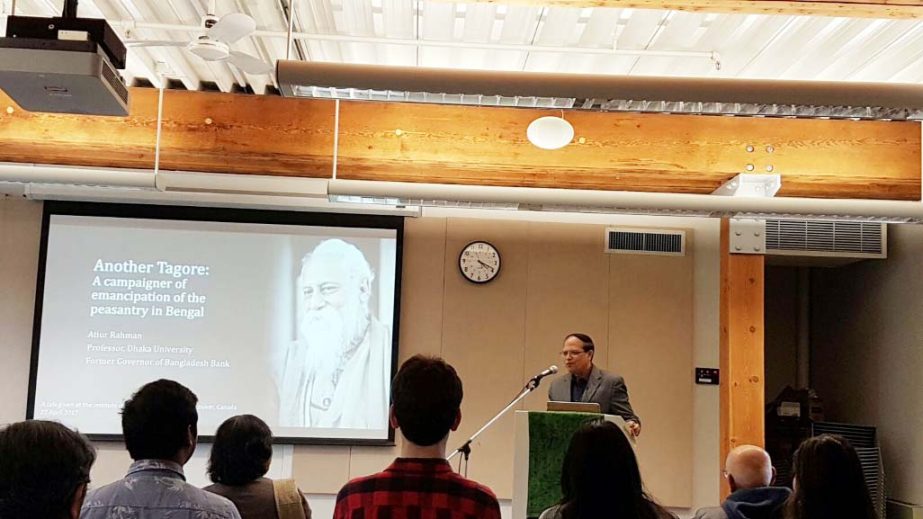
Campus Report :
Vancouver Tagore Society in collaboration with Centre for India and South Asia Research (CISAR) organized a seminar on “Another Tagore: A campaigner of emancipation of the peasantry in Bengal” by Prof Atiur Rahman on Saturday at the Institute of Asian Research (IAR), C K Choi Building, University of British Columbia (UBC), Vancouver, Canada.
The seminar was chaired by Prof Mandakranta Bose, Director of CISAR. In his talk, Prof Rahman focused on Tagore’s role as a social reformer and his deep feeling for the emancipation of the peasantry in rural Bengal. He further said that Rabindranath Tagore was indeed larger than his life. Besides his creative pursuits in art and literature for which he received a Nobel Prize, Tagore also excelled as a humane Zaminder of his family estates in East Bengal. He was very fond of his tenants and wanted to emancipate them by engaging with them. His vision for emancipation of the peasantry of Bengal was to empower them for self-development. The instruments he used to achieve his vision included: making them understand their own rights, introducing modern agriculture and finance, working together in groups for improvement, providing social services like education and health and harnessing inner strengths through cultivating arts and culture. He believed in “earned independence” and shun pity. He thought a Zaminder was only a Trustee and villagers must know how to become self-reliant.
He introduced Mandoli Systems in his estates and shared revenue with the tenants to improve their education and health. He got his son and son-in-law trained in the University of Illinois to help introduce modern methods of agriculture in his estates. He helped organize cooperatives to embrace modern agriculture by the peasants and also to improve their non-farm income-earning activities. To end vicious cycle of indebtedness of the farmers he established rural cooperative banks in Patisar and Sriniketan. He believed in reconstruction of the villages and mobilized villagers form cooperatives to realize this goal. He was in favor of self-governance of the villages.
The biggest constraint to realizing his vision was lack of self-confidence amongst the villagers. So he promoted rural art and culture by organizing various festivals so that people could come together to assert their inner strengths.
He was in favor of ‘giving himself up to what is greater than himself’ for the cause of ‘his country, of humanity, of God.’ The seminar was very well attended and appreciated followed by an interactive question answer session and a musical presentation by Arno and Shankha of Vancouver Tagore Society.
Vancouver Tagore Society in collaboration with Centre for India and South Asia Research (CISAR) organized a seminar on “Another Tagore: A campaigner of emancipation of the peasantry in Bengal” by Prof Atiur Rahman on Saturday at the Institute of Asian Research (IAR), C K Choi Building, University of British Columbia (UBC), Vancouver, Canada.
The seminar was chaired by Prof Mandakranta Bose, Director of CISAR. In his talk, Prof Rahman focused on Tagore’s role as a social reformer and his deep feeling for the emancipation of the peasantry in rural Bengal. He further said that Rabindranath Tagore was indeed larger than his life. Besides his creative pursuits in art and literature for which he received a Nobel Prize, Tagore also excelled as a humane Zaminder of his family estates in East Bengal. He was very fond of his tenants and wanted to emancipate them by engaging with them. His vision for emancipation of the peasantry of Bengal was to empower them for self-development. The instruments he used to achieve his vision included: making them understand their own rights, introducing modern agriculture and finance, working together in groups for improvement, providing social services like education and health and harnessing inner strengths through cultivating arts and culture. He believed in “earned independence” and shun pity. He thought a Zaminder was only a Trustee and villagers must know how to become self-reliant.
He introduced Mandoli Systems in his estates and shared revenue with the tenants to improve their education and health. He got his son and son-in-law trained in the University of Illinois to help introduce modern methods of agriculture in his estates. He helped organize cooperatives to embrace modern agriculture by the peasants and also to improve their non-farm income-earning activities. To end vicious cycle of indebtedness of the farmers he established rural cooperative banks in Patisar and Sriniketan. He believed in reconstruction of the villages and mobilized villagers form cooperatives to realize this goal. He was in favor of self-governance of the villages.
The biggest constraint to realizing his vision was lack of self-confidence amongst the villagers. So he promoted rural art and culture by organizing various festivals so that people could come together to assert their inner strengths.
He was in favor of ‘giving himself up to what is greater than himself’ for the cause of ‘his country, of humanity, of God.’ The seminar was very well attended and appreciated followed by an interactive question answer session and a musical presentation by Arno and Shankha of Vancouver Tagore Society.

